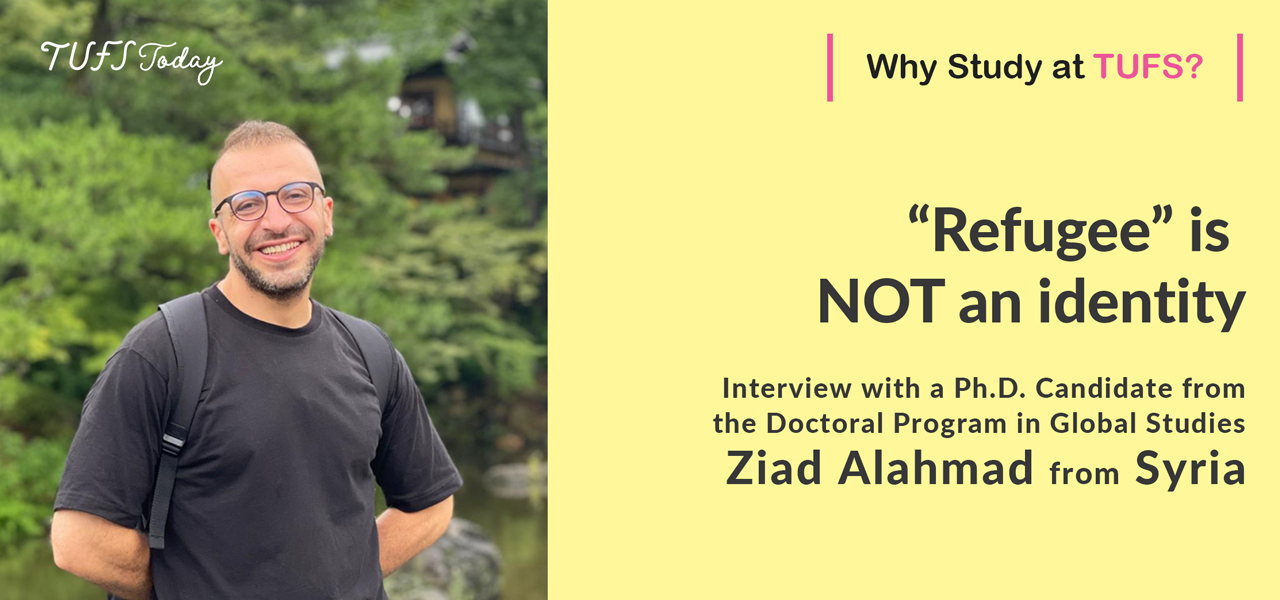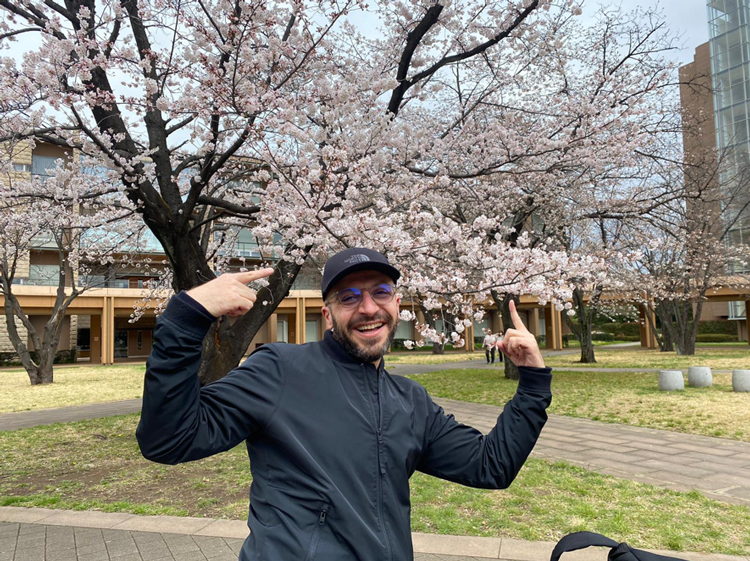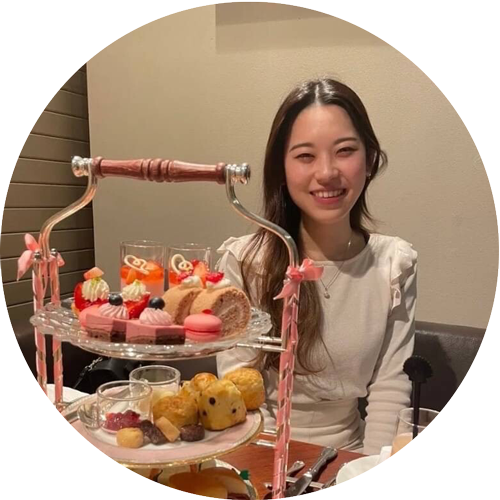“Refugee” is NOT an identity: an interview with a Ph.D. Candidate from the Doctoral Program in Global StudiesーZiad Alahmad from Syria
外大生インタビュー

The “Doctoral Program in Global Studies” at Tokyo University of Foreign Studies (TUFS) is an educational program that deals with various global issues, with a focus on languages, cultures, and politics from diverse viewpoints. The research in the Global Studies program at TUFS is not limited to a certain group or region. Several researchers have focused on diverse societies and countries from Asia, Africa, Europe, and the Americas. These days, TUFS has been expanding its scope by giving higher priority to studies focusing on less researched areas, namely: Southeast Asia, the Middle East, and Eastern Europe. This program aims to cultivate human resources capable of tackling world issues based on high-level research skills and professional knowledge of culture and society.
Today’s interviewee is Ziad Alahmad, who has been enrolled at TUFS in International and Area Studies since October 2021. Ziad’s research mainly focuses on migration-related issues. Ziad is originally from one of the countries in the Middle East (southwest Asia), Syria, which is over 8500 km from Japan. In this interview, we tried to reveal Ziad’s journey as a forced migrant, what kind of challenges he faced since leaving his home country until reaching Japan, what brought him here, how he spends his time in Japan, and what his future plans are.
Interviewer:Ms. Hori UTA, 2nd year student, English Major, School of Language and Culture / Student Reporter of TUFS PR Management Office
Study at TUFS
–––What brought you to Japan?
Similar to many Syrians my age, Japanese animation, and TV shows were the main factors that inspired my interest in Japan when I was a child. Sarutobi Sasuke, Captain Tsubasa, and Takahashi’s Castle were my favorite Japanese programs. They were broadcast in Arabic, and I watched them passionately.
Learning about Japan and being passionate about it did not stop there. After finishing my undergraduate studies, I enrolled in the Master of Japanese Studies Program at the University of Aleppo in Syria. This MA program gave me a chance to learn more about Japan, its language, culture, economy, and politics, the main subjects I enjoyed. Being engaged in that program became a catalyst for me to learn more about other communities, and how they see each other and deal with each other. This in turn led me to pursue my second master’s degree in urban sociology in Turkey.
In the Master of Japanese Studies Program at the University of Aleppo, the students usually have the chance to visit Japan for a short time, but unfortunately, I did not have the chance to visit Japan at that time as the war had erupted and diplomatic communication between Japan and Syria was weak. In fact, for safety reasons and the lack of opportunities, I had to leave Syria in early 2015, starting my journey as a forced migrant.
I moved first to Lebanon, but living in Lebanon was not a pleasant experience. I quickly migrated again to Turkey. In Turkey, my life intersected again with Japan. Before leaving Syria, a friend of mine, who was studying Japanese at the University of Aleppo, told me that “there is a Japanese NGO, and maybe if you move to Turkey, you will have the chance to work with them.” This came true. I applied for the Japanese NGO and got accepted. I was then committed to working there for about five years where I made use of my language and communication skills in a Japanese/international work environment. While working there I succeeded in leading teams, especially in the child protection sector, and earned a certification as a Project Manager in international development programs. All these developments made me more eager to move to Japan and continue my journey from there. A few years ago, I successfully passed the requirements for a Japanese government scholarship (MEXT). Finally, in 2020, despite new problems with the COVID-19 pandemic, I was allowed to come to Japan.
–––What are you studying at TUFS?
I am enrolled in the Doctoral Program in Global Studies at TUFS. My research focuses on the daily life and the future of the people who have to leave their country for another country, in other words, forced migrants. Forced migrants have difficulties in their current settlements worldwide, this could be because of the differences in culture, traditions, language, and other reasons. But also, it is because of a lack of positive communication and the spread of prejudices. In most cases, host countries are reluctant to welcome forced migrants. These countries consider forced migrants a burden, and hate speeches are escalating. Currently, I investigate how forced migrants can adapt themselves to a new environment, and how host communities can accept and interact with them positively and meaningfully.
In my research, I mainly focus on the case of Syrians in Turkey. There are around four million Syrians there, which accounts for more than half of the Syrian forced migrants abroad. Although Syrians have lived with Turks for more than ten years, the situation is not stable. More serious regulations and policies are needed to bridge the growing gap between Syrian and Turkish communities. Still, these policies should be based on high-quality scholarly research, which I am trying to contribute to in hopes that it will decrease prejudice, discrimination, and hate crimes. I am also working to block politicians who try to collect votes using anti-migrant discourse.
Did you notice that I use the term “forced migrants”, or “people”, instead of “refugees”? In my opinion, the word “refugee” has been linked to a negative image; what do you think? It is a politicized concept that presents people on the move as a liability, which, in reality, they are not. They are intelligent and have entrepreneurial ideas, are passionate, and are energetic. Again, for me, “refugee” is just a legal status, not an identity. The people who hold this status are humans equal to anyone else living on this globe. To handle the recent so-called “migration crisis” from a non-biased/humanistic point of view – in addition to solving the root causes of displacement – there is a need to find more positive or, at least, neutral terms. This revision of the image will help in dealing with forced migrants in a new way.

–––Tell us about your goal after graduation or studying abroad.
After finishing my Ph.D., although I miss my country and would love to go back, returning to Syria is not an option for me currently. I have decided to proceed with research and stand with the people who have left their home countries and are stranded worldwide. During my stay in Japan, I started having a growing interest in studying the integration of foreigners living in Japan. Japan is a nice peaceful country, but it is not foreigner-friendly enough. Foreigners can live here happily, but by themselves, isolated from the Japanese community. Japan also adds to the problem with its strong restrictions on receiving forced migrants. I feel the scholarly research and the available information on the integration of migrants in Japan is not sufficient. I would like to contribute to that research to help migrants integrate into Japanese society. I do not mind working with a university, research institution, NGO, or an intercultural communication company to achieve this goal.
These days, people in Japan have started talking about diversity more than before. But diversity should be approached from various directions. The point I want to stress is that we should consider diversity not only as an educational source but also as a practice. Good research can help in developing policies and designing programs. My passion is to find a better way for people to coexist, cooperate, and interact with each other without any prejudice or discrimination.
Life in Tokyo
–––What do you usually eat or cook?
When I first started to live in Japan, I often ate out or bought something from the market. For example, I liked gyudon and sushi. However, Japanese food mainly uses soy sauce to add taste, so it is high in sodium and carbs. It causes me to gain weight! So, I started to cook for myself recently. I cook for two or three days and make obento! We don’t have an obento-culture in Syria, so it is very interesting.
I know many good Syrian recipes; I often use tomatoes in the dishes I make, which is Syrian style cooking. Fresh tomatoes are expensive compared with other vegetables, though. I also use eggplants, zucchini, lemons, and olive oil. I can get almost all of the ingredients for cooking Syrian food at Japanese supermarkets. Finding the spices, however, is a little bit more challenging. Of course, there are some spices that I can’t buy in the Japanese market, but if I go to Shin-Okubo, I can find many of them at the south Asian shops. So, no problem!

–––Tell us about your club activities or part-time job.
Currently, I work as a part-time teacher at Bunkyo Gakuin University. I go to Bunkyo twice a week to teach undergraduate students about Syria. The name of the course I teach is “Global Englishes”. In this course, I tell the students about Syrian history, culture, traditions, and other relevant topics using the English language. I am having an amazing time there and I feel all of the students are my friends! They supply me with the energy to feel younger. I also work with another company. That company sends me to junior high schools and senior high schools in the Kanto area I tell those students about Syria and my experience as a foreigner living in Japan. Thanks to those activities, I can get opportunities to teach more about myself and my country as well as to learn from the Japanese students I communicate with.
–––How do you spend your free time outside of school?
To be honest, my room is too small for me. I can’t relax there. I mean, my room is almost only my bed. So, I always go out; for instance, I go to a cafe to study and take a walk. Also, exercising at the gym is my daily routine. I can maintain good mental and physical health thanks to exercise. This is something I will never stop; I will always work out!
–––What is your favorite place at TUFS?
Even though the campus is small compared to other universities where I have studied in Syrian and Turkey, there are many special spots I like at TUFS. I can say that the library is on the top of the list. I can focus on studying there, and being surrounded by books inspires my best writing for my articles. Also, I like Agora Global, too. It is like a café. I can relax there listening to cozy background music.

Me and Japan, a changed habit
–––What do you like to buy for your friends or family when you go back to your home country?
When I travel abroad to visit family and friends, I usually buy charming keyholders or yunomi (Japanese teacups). I buy these souvenirs from discount shops like DAISO or Don Quijote. However, I try to be careful when I buy gifts, as many products were made in China or Korea, so I have to pay attention and make sure that the items I buy were made in Japan. Speaking of souvenirs, I give my friends and family many Japanese special foods and snacks, for example, Japanese green tea, wasabi, Japanese curry, rice crackers, and matcha flavored Kit Kats. Interestingly, Japanese snacks, like Kit Kats, have a lot of flavors. Another good gift is to bring clothes from here. I have bought clothes for my friends from UNIQLO and GU because they can’t find them in their country.
–––Where in Japan do you recommend (for travel)?
I recommend Mount Takao and the Okutama area. I like hiking and often go there with my friends. Mount Takao is not far from my place, thanks to the Keio line, so I have hiked the mountain more than 20 times! I value connecting with nature and staying active. Also, when I have something to think about, I always visit Yokohama for a change. The atmosphere of Yokohama is comfortable and makes me relaxed.
–––Are there any (your) habits that have changed since you came to Japan?
Yes, I can say that my way of thinking and making decisions has changed a lot during my stay in Japan. When I lived in Syria and Turkey, it was natural for me to ask friends or family for advice and to care about the opinion of others rather than to follow my heart. In Japan, I have become more independent, so I follow my feelings and learn from my personal experience. Another thing that has changed is my view of coffee shops and the way I spend time in cafes. In Syria, cafes are lively places to chat with others, but in Japan, it is very normal to spend time alone in a café reading or writing. I have learned how to spend my time alone in Japan, which I enjoy sometimes and hate at other times.

After the interview
Today, issues surrounding forced migrants are being discussed all over the world. Through the interview with Mr. Ziad, who is earnestly working on his research to create a society where there is no friction between forced migrants and their host countries, I realized once again that the term “refugee problem” often heard in Japanese news has a negative image, and I began to think about how we human beings, who are equally born and equal despite our different cultures and customs, can coexist with each other. Thank you very much, Ziad, for your cooperation in this interview project.
Hori UTA (2nd year student, English Major, School of Language and Culture)


